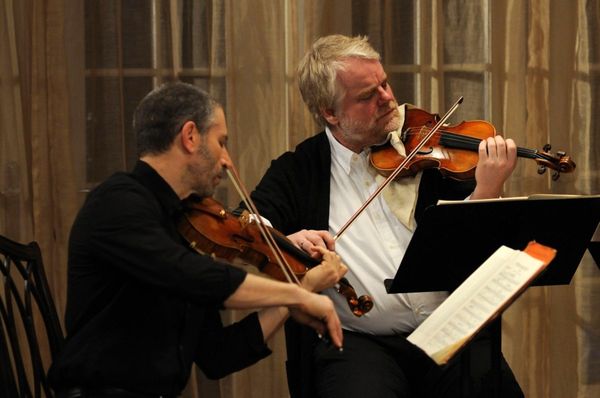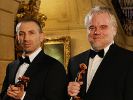Eye For Film >> Movies >> A Late Quartet (2012) Film Review

Possessed of an earnest constructedness that at times makes it seem like an exercise in thematic weight, A Late Quartet is an undeniably good film that conspires to put so much emphasis on its components and technique that it starts to feel like measured effort where one might hope for something more lyrical.
Taking place in the kind of condensed supra-New York where the only people we meet who are not Juilliard-affiliated musicians with impeccably appointed apartments are a flamenco dancer who jogs in Central Park and a neurologist played by Madhur Jaffrey. The semiotic intensity is further enhanced by the fact that these two avatars of plot development are respectively dressed in red and labelled "Dr Nadir".

It feels almost churlish to complain about this, but A Late Quartet's most significant flaw is in the precision of its composition. It is effectively a filmic version of a literary fiction, a movie that is a novel that invites the kind of reading that makes students of English Literature so bitter. Once it has established itself it unfolds with an almost metronomic inevitability, but for all that, for all that, it still satisfies.
The title is a multiple allusion, firstly to the central piece of music, Beethoven's String Quartet No. 14, herein most frequently refered to as Opus 131. Secondly to a string quartet, entering their 25th year, their 25th season together. There's a nominative clue to the fragility of this assemblage, they are titled "The Fugue Quartet". A dream they are indeed, a full touring schedule that roams the globe, the kind of success that gets you on the front cover of Gramophone, and, well, a cast staggering in its quality.
Mark Ivanir is Daniel, first violin, instigator of the quartet's formation. Philip Seymour Hoffman is Robert, second violin, tour manager and husband of Juliette, viola, played by Catherine Keener, and her mentor, even adoptive father, Peter, a cello-wielding Christopher Walken. To even begin to determine how many awards they've won is an exercise in futility - they're all very good, all give very good performances. Imogen Poots turns up as Alexandra, Juliette and Robert's daughter, she's good too, the cast is impeccable. The supporting players too, from Wallace Shawn (you know, that guy, Rex from Toy Story) to Opera singer Anne Sofie von Otter and also acclaimed cellist Nina Lee as, well, herself.
Seth Grossman and Yaron Zilberman wrote the film, the former wrote 2006's Elephant King while the latter directed the documentary Watermarks. Zilberman also directs here, and demonstrates a good eye. The Brentano String quartet (in which Nina Lee is cellist) provide the fictional quartet's music, and Angelo Badalamenti provides the rest of the score. In truth Badalamenti's contribution feels like it's been heavy-handedly deployed. It's good but there comes a point where it begins to feel intrusive; then almost immediately afterwards there is a scene between Hoffman and Ivanir that is just them talking, punctuated by the tick of clocks, perhaps the clicking of cooling pipes. It's all the more striking because there is no music, and it's that distinctiveness that leads to the film's biggest issue.
It's clever. It may, in fact, be too clever, trying too hard - Opus 131 has seven movements and it's possible to argue that the film does too, but from the moment that Peter's Parkinson's is diagnosed it works so hard to build symbolic weight and return to themes that it begins to feel laboured, straining with a desire to communicate import. It seems built for close-reading, to the extent that the activity features in the film itself - when approaching the 131 for the first time Alexandra is instructed to read a biography of Beethoven, her mentor in the activity uses a score so scrawled with notes that it is scarcely recognisable, and the satisfaction with the film's conclusion requires consistent attention to detail.
The plot is dense, closely inter-connected, almost parodically so - the quartet's relationships are so incestuous they'd not be out of place in George RR Martin's Westeros. In this Allen-esque fantasy-Manhattan of fine-art (the Frick Collection allowed filming in their galleries for the first time for this production) and concert-halls and wood-panelled luxury apartments, of snow-covered Central Park and nice restaurants and sleazy dives that still manage to have live flamenco it just about makes sense because for all the technical detail it's fantastic. In the fabulist sense, rather than the fabulous, but that's not to ding its quality - the sets are beautifully dressed, and so are the cast - some with a keen eye for the placement of furniture, others with the assistance of Yves Saint-Laurent. It does in places tend to cliche, to the extent that we can tell which relationships are in trouble from the moment they are introduced, but they're cliches because they've worked in the past and they do not bad here.
There's so much going on here, so many parts running in conjunction, so many notes reflected from the other pieces involved - so many notes bouncing back and forth that even in its complexity it starts to become something more than the sum of its parts. There's a moment where Peter tells a story that originally belonged to Gregor Piatigorsky, about looking for novelty and positive technique even when things aren't going well, and it works for the film - it's paying so much attention to giving everything import that it sometimes loses track of itself, tries too hard, but there are moments when its trying too hard is stunning. For all its awareness it could have done with a joke or too - a moment with a Rembrandt parallels the Fighting Temeraire's appearance in Skyfall, but there's a moment that's closer - Joseph II talking about The Marriage of Figaro, "too many notes". It's still good, even great, but it's just got, well, too many notes.
Reviewed on: 03 Apr 2013

















